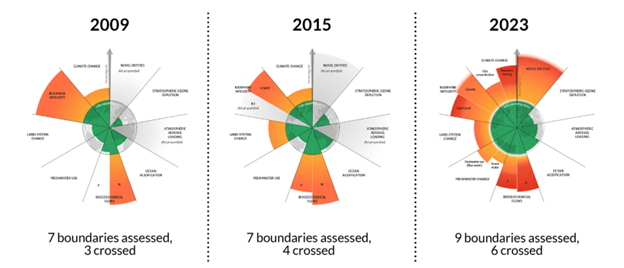
Summary
Large multinational corporations exert a lot of pressure on the planetary boundaries—6 of the 9 planetary boundaries have been crossed. Yet our systematic literature review demonstrates that management scholars are primarily focused on one boundary—climate change. To address all the boundaries, we call for a change in how business scholars theorize, measure, and engage. In a world of fast-moving, volatile, non-linear ecosystem change, the planetary boundaries must be the foundation for management scholarship and practice.
Blog post
Corporations exert a lot of pressure on the planetary boundaries. The planetary boundaries framework identifies nine Earth system processes that regulate the biophysical stability of the planet and define the safe operating space for humanity. As the boundaries are crossed, risks for humanity, such as climate induced natural disasters, increase. Research demonstrates plastic production affects all of the planetary boundaries with major impacts on novel entities (chemical pollution), climate, and biodiversity. The mining sector has large impacts on land use change, water, and climate. 70% of greenhouse gas emissions can be attributed to 100 transnational and state-owned companies and the proportions are high for other boundaries. Our research shows that, despite the massive impact of companies on Earth system processes and their declining state, management scholars are mainly focused on one boundary—climate change.
We conducted a systematic literature review, published in Journal of Management Studies, of business research including management, accounting, and finance journals. We asked the questions, “How has the planetary boundaries concept been integrated into business studies and how has research on each of the nine boundaries advanced?”
Encouragingly, research on both questions is growing. We found that by the end of 2022, about 20 articles per year were published that connect the firm-level to the planetary boundaries concept. 481 articles were included for our second research question on the nine boundaries.
However, our results demonstrate that business research is largely disconnected from the planetary boundaries as a whole and lacks a systems perspective. Most studies focus on climate change and few have considered the managerial implications of the interactions between the boundaries.
Given the alarming state of the planet, and our findings that business research is disconnected from the environmental state of affairs we suggest that scholars need to change the way they theorize, measure and engage to establish the planetary boundaries as the foundation for the field. Systems theorizing can help business scholars to connect the firm-level to the planetary boundaries. Systems theorizing also entails taking an interdisciplinary approach to bridge the social and the natural sciences. Measurement approaches should be developed for understudied boundaries and their interactions. Business scholars can also engage with businesses to develop science-based pathways within the planetary boundaries or develop knowledge or tools that can be more broadly used.
Our article, while focused on management, accounting and finance research, provides valuable insights for practice, emphasizing the urgency for managers to consider planetary boundaries in their strategic decisions. Businesses often operate beyond these boundaries, primarily focusing on climate change while neglecting broader Earth system challenges. To remain competitive and mitigate risks, managers must adopt a holistic, science-based perspective that aligns with planetary limits.
As more boundaries are being crossed, volatility will only increase. That means, managers need to set strategies and implement solutions aligned with the planetary boundaries. Developing science-based approaches will not only ensure a competitive advantage but also proactively manage risks that are associated with crossing the boundaries. Operating within the planetary boundaries will not be easy, and the implications for many sectors are far-reaching but there is no time left to lose.

0 Comments